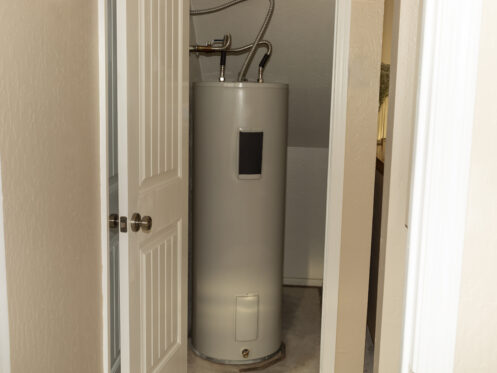While this is a relatively rare occurrence, a water heater does have the potential to explode. An explosion may result in the release of several gallons of water throughout your basement or wherever you have the appliance installed in your home. Let’s take a closer look at some signs that your water heater is going bad and potential consequences of an explosion.
Beware of Pressure Buildup
Pressure buildup in the tank is one of the primary reasons why a water heater explodes. Over time, sediment buildup can make it difficult or impossible for gas and heat to effectively exit the tank. In some cases, the sediment creates a hole in the holding tank that prevents the pressure from being released. It’s also possible that buildup results in a stuck temperature and pressure (T&P) valve.
Keep an Eye on the T&P Valve
You shouldn’t be alarmed if the valve opens every so often as it simply means that it’s doing its job. However, if it opens frequently, it signals a problem that you need to have addressed by professionals. If you notice that the valve stays open, it means that it’s stuck and won’t be able to handle a future issue.
Other Potential Signs of a Water Heater Issue
Water leaking from the tank often means that your home’s water heater is defective and needs to be replaced. The color of the water will give you a better idea of the cause of the leak as moisture that’s red or brown is likely caused by sediment in the tank.
You might also hear a whistling noise from the unit or other odd noises while it’s in operation. Finally, a water heater may be defective if there are issues with water temperature or pressure while taking a shower or washing dishes.
Gas Leaks Can Cause Explosions
Even if your water heater is in pristine condition, you might still be at risk of an explosion if there is a gas leak somewhere in your home. A leak might be the result of improper installation or because of other issues related to the age or condition of a gas line.
If you smell something akin to rotten eggs anywhere in your house, it’s a telltale sign of an ongoing leak. The smell is caused by an ingredient mixed into natural gas that would otherwise be odorless. Ideally, you will get out of the house and call your local utility for help. A gas leak could create conditions that are conducive to an explosion if it were to interact with the heat created by the water heater.
Additional Potential Consequences of an Explosion
At a minimum, anyone who is in close proximity to a water heater when it explodes could be at risk of serious injury. There is also a chance that it will shoot through multiple stories of your home, and it’s possible that it could fly through the roof.
This might result in structural damage to several rooms of your home, and it’s possible that it would render your home uninhabitable. If the water heater were to escape your home and land on another person’s property, you may be liable for any damage caused by the incident.
Even if your water heater stays where it is, moisture can result in mold growth, eat away at insulation and cause foundation damage. It may also provide termites, ants and other pests an incentive to come into your house for an easy drink.
Minimizing the Risk of an Explosion
There are steps that you can take to minimize the risk of an explosion such as annual inspections to get rid of sediment or to locate tank defects. An inspection may also discover gas line problems or other issues that might put your water heater in danger of exploding. If your water heater is still within the warranty period, regular maintenance may ensure that you don’t void it if an accident occurs.
At Priority Plumbing & Drain, we can install, maintain or repair tankless products as well to ensure that we meet your needs and budget with ease. If you are in need of water heater maintenance, don’t hesitate to get in touch with the team at Priority Plumbing & Drain in Pasadena, MD today!





